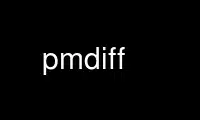
This is the command pmdiff that can be run in the OnWorks free hosting provider using one of our multiple free online workstations such as Ubuntu Online, Fedora Online, Windows online emulator or MAC OS online emulator
PROGRAM:
NAME
pmdiff - compares archives and report significant differences
SYNOPSIS
pmdiff [-d/--keep] [-z/--hostzone] [-p/--precision precision] [-q/--threshold thres]
[-S/--start starttime] [-T/--finish endtime] [-B/--begin starttime] [-E/--end endtime] [-x
metric] [-X file] [--skip-excluded] [--skip-missing] [-Z/--timezone timezone] archive1
[archive2]
DESCRIPTION
pmdiff compares the average values for every metric in either one or two archives, in a
given time window, for changes that are likely to be of interest when searching for
performance regressions.
The archive log has the base name archive and must have been previously created using
pmlogger(1). The pmlogsummary(1) utility is used to obtain the average values used for
comparison.
There are two sorts of invocation of the tool: with either one or two archives.
In the first case, the only sensible command line requires use of all four time window
arguments. These are specified using the same time window format described in
PCPIntro(1), and are -S/--start and -T/--finish for the start and end times of the first
time window of interest in the archive, and -B/--before and -E/--end for the start and end
times of the second time window of interest.
In the second case, with two archives, the -B/--before and -E/--end options might be
unnecessary. This might be the case, for example, when comparing the same time window of
two consecutive days (usually two separate archives), or a time window on the same day of
different weeks.
In either case, pmdiff produces a sorted summary of those metrics in the specified window
whose values have deviated the most from a minimal threshold. The level of deviation is
calculated by dividing the average value of each metric in both logs, and then calculating
whether the ratio falls outside of a range considered normal. This ratio can be adjusted
using the -q/--threshold option, and by default it is 2 (i.e. report all metrics with
average values that have more than doubled in the two time windows or more than halved in
the two time windows).
If the baseline value is zero and the comparison value is non-zero, the ratio is reported
as ``|+|'' (infinitely large). If the comparison value is zero and the baseline value is
non-zero, the ratio is reported as ``|-|'' (infinitely small).
Reported metrics are sorted in ascending ratio order.
Should any metrics be present in one window but missing from the other, a diagnostic will
be displayed listing each missing metric and the archive from which it was missing.
The remaining options control the specific information to be reported. Metrics with
counter semantics are converted to rates before being evaluated.
-p/--precision
Print all floating point numbers with precision digits after the decimal place.
--skip-excluded
Cull the list of names of metrics being excluded from the output.
--skip-missing
By default, pmdiff will report the names of any metrics that are in one archive but
not the other. This option suppresses that reporting.
-x Compare each metric in each archive in the time windows specified to a given egrep(1)
pattern, excluding those that match from the report output.
-X Allows a file to be specified which containing egrep(1) patterns which are applied to
the metric names to optionally exclude some from the report.
-z Use the local timezone from the given archives.
-Z/--timezone
Changes the timezone in the archive labels to timezone in the format of the
environment variable TZ as described in environ(7).
Use pmdiff online using onworks.net services
